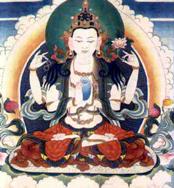When the Bodhisattva practices feeling-contemplation on feelings, he conceives
a great compassion for those beings who cling to the happiness of feelings. And
he thoroughly learns to understand: "Happiness is where there is no feeling."
He practices feeling- contemplation on feelings, for the sake of helping all beings
to give up (attachment to) feelings. For (effecting) the cessation of feelings
in beings, he dons his armor; but for himself he does not strive after the cessation
of feelings. Any feeling felt by him is pervaded by deep compas- sion. When experiencing
a pleasant feeling, he conceives deep compassion for beings whose character is
strong- ly inclined to lust, and he himself gives up the propensity to lust. When
experiencing an unpleasant feeling, he conceives deep compassion for beings whose
character is strongly inclined to hatred, and he himself gives up the propensity
to hatred. When experiencing a neutral feeling, he conceives deep compassion for
beings whose char- acter is strongly inclined to delusion, and he himself gives
up the propensity to delusion. He is not attracted by a pleasant feeling, but
strives after the eradication of attraction. He is not repelled by an unpleasant
feeling, but strives after the eradication of repulsion. He is not left in ignorance
by a neutral feeling, but strives after the eradication of ignorance. Whatever
feeling he experiences, all feeling he knows as transient; all feeling he knows
as painful; all feeling he knows as not-self. He feels the pleasant feeling as
transient; the unpleasant feeling as a thorn; the neutral feeling as peaceful.
Thus, indeed, what is pleasant, is transient; the unpleasant is (transient) just
as the pleasant, and the neutral is without an ego.

